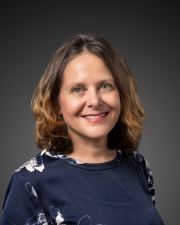Amid tensions, Penn GSE free speech scholar promotes inclusion and diversity of ideas in “Nature Human Behaviour”
As administrators and faculty grapple with free speech boundaries and deep polarization, Penn GSE free speech scholar and democratic theorist Sigal Ben-Porath urges them to find common ground and foster dialogue.
“It is not enough to think about protecting speech through policies and say what is allowed and what is not,” said Ben-Porath, the MRMJJ Presidential Professor of Education and faculty director of Penn’s Stavros Niarchos Foundation (SNF) Paideia Program. “We need to really create a lively conversation and invite everyone to participate within the policy-based boundaries of speech. It is our job as institutions.”
In a recent article in Nature Human Behaviour, “How to Depolarize Your Students,” Ben-Porath advised institutions to abandon attempts to find a middle ground and instead nurture common ground with evidence rooted in research.
“The work of universities and the health of higher education depend on reversing the democratic backsliding that polarization breeds,” she wrote. “Faculty members and other higher education professionals can do their part by providing students with opportunities to be informed and engaged, rather than suspicious and detached.”
Since the Oct. 7 attack on Israel by Hamas militants, the bounds of free speech, academic freedom, and consequences of hate speech have roiled campuses, and Ben-Porath’s work has taken on new urgency.
“We have to start by communicating our expectations as an institution to faculty and staff and then to students about how we will engage with each other,” noted Ben-Porath. “It is very important to clarify that everyone who studies there belongs … regardless of their views or backgrounds.”
The stakes are high as institutions navigate the bounds of acceptable speech and protest. Many campuses were already wrestling with polarization related to sexuality, immigration, identity, and race, and the upcoming 2024 presidential election could ignite further unrest.
As an expert on free speech and higher education, Ben-Porath has been crisscrossing the country, advising school leaders on free speech policy and writing extensively.
“More and more colleges now realize that they have to be committed to dialogue and intentionally and explicitly teaching students to connect across their differences in background, identity groups, ideologies, experiences,” Ben-Porath said.
Ben-Porath, who is also an associate member of the political science and philosophy departments at Penn, recently addressed the politicization of school boards and has written several books on free speech in education and democracy, including a timely title, Cancel Wars: How Universities Can Foster Free Speech, Promote Inclusion, and Renew Democracy.
To encourage diversity and exchanges of ideas, Ben-Porath advises universities to host robust academic and social offerings, such as:
• Offer courses, seminars, events, and workshops on open dialogue and civic engagement.
• Host events in residence halls and other social spaces for students from different groups and viewpoints to socialize.
• Promote social engagement between student groups, such as dinners and recreational events.
• Organize interactions with community groups or students from other universities.
• Encourage students to room with randomly selected peers to encourage diversity.
“They need to create all of these contexts where students and faculty can engage thoughtfully and openly, both with each other and across different groups,” Ben-Porath said.
Faculty play a critical role in fostering dialogue and inclusion, Ben-Porath added. She recommends that professors and instructors share norms and boundaries with students at their first meeting and in the syllabus and ask students for input. Faculty can welcome challenging topics into classroom discussion and devote time to discussing differences in opinion.
For example, Ben-Porath said faculty should facilitate constructive debate by asking students to craft evidence-based arguments, serve as “expert witnesses” to support their viewpoints, and critically explore conflicting positions.
“This process can build trust in others’ humanity and goodwill and establish a clear understanding of what makes information reliable,” Ben-Porath observed.
While the debate over free speech on campus shows no sign of abating, Ben-Porath said educators must lead.
“You are not born knowing how to be a democratic citizen in a diverse, polarized society,” she said. “The only way is to teach people in their classes and reflect it in events, norms, and expectations.”

